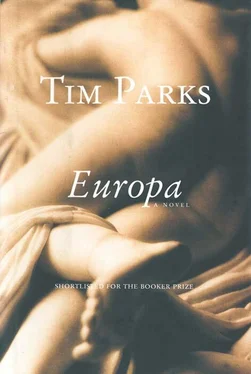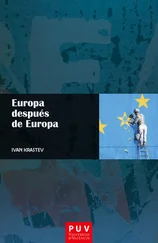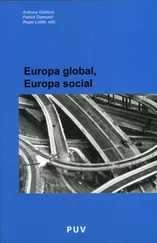Tim Parks - Europa
Здесь есть возможность читать онлайн «Tim Parks - Europa» весь текст электронной книги совершенно бесплатно (целиком полную версию без сокращений). В некоторых случаях можно слушать аудио, скачать через торрент в формате fb2 и присутствует краткое содержание. Год выпуска: 1999, Издательство: Arcade Publishing, Жанр: Современная проза, на английском языке. Описание произведения, (предисловие) а так же отзывы посетителей доступны на портале библиотеки ЛибКат.
- Название:Europa
- Автор:
- Издательство:Arcade Publishing
- Жанр:
- Год:1999
- ISBN:нет данных
- Рейтинг книги:3 / 5. Голосов: 1
-
Избранное:Добавить в избранное
- Отзывы:
-
Ваша оценка:
- 60
- 1
- 2
- 3
- 4
- 5
Europa: краткое содержание, описание и аннотация
Предлагаем к чтению аннотацию, описание, краткое содержание или предисловие (зависит от того, что написал сам автор книги «Europa»). Если вы не нашли необходимую информацию о книге — напишите в комментариях, мы постараемся отыскать её.
Europa — читать онлайн бесплатно полную книгу (весь текст) целиком
Ниже представлен текст книги, разбитый по страницам. Система сохранения места последней прочитанной страницы, позволяет с удобством читать онлайн бесплатно книгу «Europa», без необходимости каждый раз заново искать на чём Вы остановились. Поставьте закладку, и сможете в любой момент перейти на страницу, на которой закончили чтение.
Интервал:
Закладка:
Vikram Griffiths laughed as he spoke behind his whisky flask and the coach lurched to avoid some miserable humpy machine from backward Eastern Europe where they never learnt to build cars the way we did, and clutching at a seat-back for balance as the driver switched lanes, finger-nails slipping on the synthetic red velvet that looks so plush, that promises such luxury, the way all that is modern promises such luxury, invites such complacence, such sitting back in this world of paved roads and metalled directions, gleaming surfaces, reclinable seats, this world where everything is ready for us, technically, to be happy, I was completely disorientated, as I am so again now in this narrow bed in this suburban hotel, watching the light flit over and over Picasso’s lovers, completely and utterly disorientated, thinking of the important responsibilities I have accepted for tomorrow; and which somebody like myself should never have accepted, thinking of all the half-truths I shall have to tell if I am to do my job well, if I am to be loyal to my feckless colleagues (and really only the feckless attract my loyalty), and thinking once again of the way Vikram Griffiths so blatantly sought to establish a complicity with me, a complicity directed against Colin Mattheson, who he knows is my present drinking companion, by making this disparaging remark about Colin's not caring for his students. For Christ’s sake! As if I cared for mine! And what amazes me, going back now over this conversation with my drunken but endearing colleague, Welsh of Indian extraction, as I seem to be condemned to going over and over all my conversations, so that if I’m not engaging in a conversation you can be sure that I am going over one and generally wishing I hadn’t engaged in it — what amazes me is how I have never been able to be either an earnest supporter of good causes, or a manipulator, as Vikram Griffiths is somehow both, never an idealist and never a pragmatist, as she is somehow both, so idealistic in her love and so pragmatic in its distribution, but always as it were almost an idealist, yet not quite ingenuous enough, almost a pragmatist, yet too romantic, too scared perhaps, until at some point I fell into this role of the eternally rancorous detractor, but dreaming of some unimaginable commitment, some unimaginable propriety, which I almost achieved with her , but never properly believed in, until the day she made it impossible.
Then somewhere beyond Lucerne, having finished the whisky and feeling I wouldn’t last much longer on my feet and with the driver complaining to Vikram over the radio, now grinding out accordion-accompanied love, in German, that somebody somewhere was smoking, definitely smoking, and if they didn’t stop, he personally, the driver, would stop the coach and throw them off, because while his arm might be twisted into accepting a dog he would never let people impregnate his nice upholstery with smoke, he hated smoke, I said I would go and sort the matter out. I blundered back along the aisle, banging against the seats, remembering, incongruously, as I turned my head away from her , holding my breath against her perfume, how even on that trip to Rheims which remains for me, as Olympia for the Greeks, the very image of happiness (something past and distant and unforgettable), even on that trip she remembered to visit her childhood dentist for a filling she felt she had lost a piece of. Perhaps I had dislodged it with my fierce tongue, she sighed. She laughed. So that in the end I was granted two more days of paradise to lose because the man decided she needed a root canal.
At the back it was Colin, the tottie-man, smoking, holding a cigarette between finger and thumb, the coal turned inward to his palm, as if this could ever hide the smoke drifting out. I told him of the driver’s threat, at which, enjoying the opportunity to impress with childish transgression, for this is what groups do to people, and above all what they do to people like Colin, who are simply begging for some formal situation in which transgression will be visible, he scuttled to the stairwell leading down to the door just in front of Doris Rohr’s seat — the driver wouldn’t be able to see him there, he said, as if it was a question of seeing — and poking his head round grey-trousered legs, for Barnaby Hilson was now sitting next to Doris Rohr, earnestly discussing the merits of the Dead Poets, he took a pantomime drag with pouting moustache and said, Suck. Di’n’t I say suck was anuvver of me fav’rite words!
While everybody was laughing at this, I took his place, which is to say I took my own place, because it was number 45 again, as I couldn’t help noticing on the oval plastic tag sunk into the luxury red velvet which must not be impregnated with smoke, and exactly as I did so and remembered once again, as if I had ever forgotten, my age and her phone code and my address, I heard Barnaby Hilson, who is Irish and a writer, in his late twenties, objecting to Doris Rohr, who’d felt that the nice boy’s suicide was unnecessary that the film was so good precisely because the boy does die , that is, it was a good film because the director had allowed something to happen , he hadn’t shunned the obvious fact that seizing the day was dangerous . Aspirations are dangerous, I heard Barnaby Hilson say, as I sat down on seat 45, with no other aspiration, it occurred to me, than to get through somehow. To get through what? Just through, I shall get through, I keep telling myself, I must get through, what else can I do but get through, however unlikely that sometimes seems? Whereas Barnaby Hilson of course is a budding novelist, Irish, ambitious, Catholic, young, and he likes to hint at successes by complaining about low publication advances and literary mafias in imperialist London, and the subtext of all his conversation, even this debatable remark on the supposedly courageous narrative structure of a box-office blockbuster, is that he, Barnaby Hilson, a clever, clean-shaven boy from a middle-class family in County Cork, has a real vocation; for him the job of foreign language teacher at the quite atrocious University of Milan is a mere, though always properly discharged (because he has a sense of self-respect), sideline, to pay his way, while the rest of us are really rather sad cases with nothing to do but mark time and cling to our salaries; and my problem dealing with Barnaby Hilson, who has had one novel published in Ireland and more recently one in paperback original in imperialist London, is that I couldn’t agree more, but I hate him for saying it, for reminding me of it, as if I needed reminding. So that when, later on, I quoted Benjamin Constant at Barnaby Hilson across the huge table of one of those irksomely German stube-style restaurants with their long plain scrubbed wooden tischen where strangers are supposed to sit elbow to elbow under hunting trophies and be jolly together, as if belonging to the human race meant we had anything in common — when I quoted Benjamin Constant to Barnaby Hilson, who was offering himself as, as he put it, a compromise candidate in a delicate situation, I did so entirely out of envy and rancour and not with any desire whatsoever to become the foreign lectors’ representative to the European Parliament .
And because I thought she might recognize the book I had got it from.
I sat down in seat 45, wondering if the powers that be, like the script-writer of Dead Poets , would have the wisdom to allow something to happen on this otherwise preposterous and preposterously dull trip, and on my left this time, as I lowered myself on to the big back seat of this powerful modern coach crossing the Confederation of Switzerland, on my left was a new girl with a plaster-cast on her ankle who was deep in conversation with Georg on her other side, and what she was saying, very earnestly, as I tuned out of Barnaby Hilson’s conversation and into hers, was that she didn’t expect she would ever live to be forty. Georg smiled his mature man’s smile and asked her why, and he winked at me across the girl as I sat down wishing I hadn’t drunk Vikram s whisky, or that there had been more of it. These girls are so young, Georg’s wink said, while she — and since I can’t remember her name, can’t remember whether she even told me her name, I’m going to call her Plaster-cast-tottie, as if I was speaking of a conquest to Colin, because that kind of vulgarity cheers me up, if only by reminding me how callous and downmarket I can be — yes, Georg winked while Plaster-cast-tottie, or perhaps just Plottie, explained that she would never get to forty because there were so many diseases and wars and things . Georg smiled again and admitted he was forty-three.
Читать дальшеИнтервал:
Закладка:
Похожие книги на «Europa»
Представляем Вашему вниманию похожие книги на «Europa» списком для выбора. Мы отобрали схожую по названию и смыслу литературу в надежде предоставить читателям больше вариантов отыскать новые, интересные, ещё непрочитанные произведения.
Обсуждение, отзывы о книге «Europa» и просто собственные мнения читателей. Оставьте ваши комментарии, напишите, что Вы думаете о произведении, его смысле или главных героях. Укажите что конкретно понравилось, а что нет, и почему Вы так считаете.












